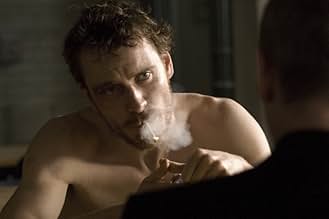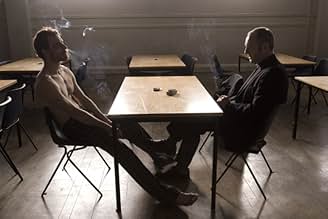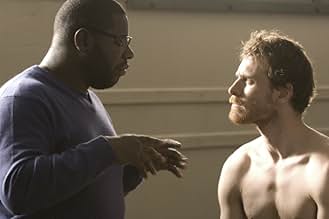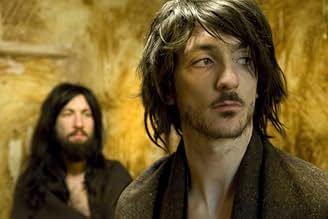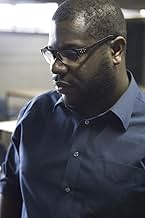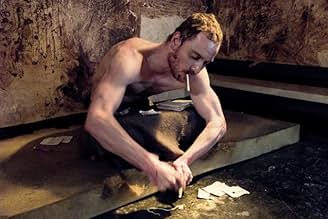Bobby Sands, un republicano irlandés lidera a los reclusos de la prisión de Irlanda del norte en una huelga de hambre.Bobby Sands, un republicano irlandés lidera a los reclusos de la prisión de Irlanda del norte en una huelga de hambre.Bobby Sands, un republicano irlandés lidera a los reclusos de la prisión de Irlanda del norte en una huelga de hambre.
- Dirección
- Guionistas
- Elenco
- Ganó 1 premio BAFTA
- 49 premios ganados y 39 nominaciones en total
- Dirección
- Guionistas
- Todo el elenco y el equipo
- Producción, taquilla y más en IMDbPro
Opiniones destacadas
Hunger is a powerful and disturbing feature-film debut for the visual artist Steve McQueen. The film takes place almost exclusively within the confines of a high-security prison in Northern Ireland, where many members of the Irish Republican Army are interned. The small confines of the prison serve as a microcosm of the wider Troubles in Ireland. The conflict between the British wardens and the Irish inmates escalates steadily, with each indignity and abuse inevitably leading to another.
The conditions revealed in the prison are deeply disturbing, with the inmates fouling the jail with effluent and the guards responding with ritual humiliation and savage beatings. McQueen's camera is an unflinching witness to the squalor and cruelty, and with the vivid imagery and forceful sounds it is almost possible to smell and feel the frightening environs of the film.
Although the focus of the film ultimately falls on Bobby Sands, the IRA member and inmate who leads a fatal hunger strike within the prison, we are not introduced to the main protagonist until a third of the way through the film. This approach works remarkably well in setting the scene for the main narrative, but it is disappointing that the different perspectives on each side are somewhat sidelined thereafter, as Sands's personal struggle takes centre stage.
The terrible squalor of the prison cells provides some of the film's most powerful images, but it is the second third of the film that is the most gripping, as Sands converses and argues with a visiting Catholic priest. An unmoving camera is trained upon these two protagonists for what must be nearly half an hour, as Sands reveals his plan for a new hunger strike and defends his methods of achieving political goals, ultimately berating what he sees as the priest's despondency and inertia. This is an utterly compelling piece of cinema.
However, at the end of this gripping conversation, the director sees fit to insert a somewhat tortured analogy as Sands recalls for the priest a defining moment of his boyhood. This is an unnecessary effort to inject conventional beauty into Sands's story, and sits awkwardly with the general tone of the film.
In the final third of the film, the hunger strike is depicted in by now characteristically brutal detail. Lead man Michael Fassbender clearly underwent a very painful regime to portray the wasting and withering of Bobby Sands in his last days. Unfortunately, amidst the impressive attention to detail, McQueen goes further in romanticising his main protagonist through a series of flashbacks to Sands's childhood. This again jars with the realistic feel of the rest of the film, and points to McQueen's obsession with Sands, which he has admitted to having had since a young age.
Although at times steering a little close to hagiography, McQueen's directorial debut is still a bold and engrossing film that cultivates an understanding for the very different people caught in up in the Troubles in Northern Ireland. It will be fascinating to see what his next project will be.
The conditions revealed in the prison are deeply disturbing, with the inmates fouling the jail with effluent and the guards responding with ritual humiliation and savage beatings. McQueen's camera is an unflinching witness to the squalor and cruelty, and with the vivid imagery and forceful sounds it is almost possible to smell and feel the frightening environs of the film.
Although the focus of the film ultimately falls on Bobby Sands, the IRA member and inmate who leads a fatal hunger strike within the prison, we are not introduced to the main protagonist until a third of the way through the film. This approach works remarkably well in setting the scene for the main narrative, but it is disappointing that the different perspectives on each side are somewhat sidelined thereafter, as Sands's personal struggle takes centre stage.
The terrible squalor of the prison cells provides some of the film's most powerful images, but it is the second third of the film that is the most gripping, as Sands converses and argues with a visiting Catholic priest. An unmoving camera is trained upon these two protagonists for what must be nearly half an hour, as Sands reveals his plan for a new hunger strike and defends his methods of achieving political goals, ultimately berating what he sees as the priest's despondency and inertia. This is an utterly compelling piece of cinema.
However, at the end of this gripping conversation, the director sees fit to insert a somewhat tortured analogy as Sands recalls for the priest a defining moment of his boyhood. This is an unnecessary effort to inject conventional beauty into Sands's story, and sits awkwardly with the general tone of the film.
In the final third of the film, the hunger strike is depicted in by now characteristically brutal detail. Lead man Michael Fassbender clearly underwent a very painful regime to portray the wasting and withering of Bobby Sands in his last days. Unfortunately, amidst the impressive attention to detail, McQueen goes further in romanticising his main protagonist through a series of flashbacks to Sands's childhood. This again jars with the realistic feel of the rest of the film, and points to McQueen's obsession with Sands, which he has admitted to having had since a young age.
Although at times steering a little close to hagiography, McQueen's directorial debut is still a bold and engrossing film that cultivates an understanding for the very different people caught in up in the Troubles in Northern Ireland. It will be fascinating to see what his next project will be.
Bobby Sands (Michael Fassbender) did something that was a risk, one that would have made others squirm or back out. He was in prison already for four or more years, as a leader in the IRA in Ireland, when he decided to go on a hunger strike. Not just him, mind you, but others along with him, who would all go hungry and, more than possibly, put their bodies on the line for the sake of their brothers in the war, until Britain did something. But the brilliance of Hunger is that director Steve McQueen (not to be confused with the action star) gives us a very straightforward (shockingly so) view of the conditions at the prison, the cell-block where IRA members were put in cells, inhumanely in fact, with feces commonly strewn on the walls and prisoners regularly beaten by SWAT teams and prison guards in general... then, after a very long scene of talk where Sands hears his own plan in front of a priest, the hunger strike in action. It's unrelenting cinema.
It's also sometimes a bit much to take in. You have to know this is not at all melodramatic, but done with little dialog, sometimes in just a few words or whispers (a female narrator pops up once or twice to put things into a sort of context), and compositions that bring out claustrophobia and the endless time spent in the prison. One might wonder why McQueen chooses to keep a shot going for so long on something as trivial, or just routine, as a guard cleaning up the urine left by all the prisoners in the hallways (all in one shot), but it's about that really: the routine of a horrible process of living, of 'us' and 'them' between the prisoners and the guards in this Northern Ireland prison, with Sands as a sort of unofficial leader inside. The length of shots, and the moments where characters burst out in anger and rage, are deliberate and dramatic and powerful.
If I had any problem with Hunger, it's that it is misleading in its first half hour. We're given two prisoners, not Sands, and a prison guard, and we're shown the horrid conditions of living in a solitary-confined prison (feces on the wall, anyone?). But Bobby Sands, the main character, isn't introduced for quite a while. It's an outstanding scene when he is introduced, kicking and pounding and getting beaten down as his hair and beard are cut, yet by then it's been perhaps too long to get to this point. It's also jarring how McQueen structures his film it terms of silent and sound: there's a fifteen minute stretch (almost all in one two-shot) where there's nothing but dialog between Sands and the priest (albeit a riveting conversation about sacrifice and humanity), but aside from this it's all just watching first the IRA members in the horror of prison conditions, and second Sands in his deterioration of the hunger strike.
And yet it is a powerful experience and a stunning debut. It reminds me a little like The Machinist in observing its lead character fade away, literally, before our eyes, only here the stakes are far greater than a tricky neo-noir plot. Fassbender is also mesmerizing for any given moment he's on screen. And yet as great as the film ultimately may be, or is, I don't have a desire to watch it again. It's about as bleak as a rainy day in Dublin - I mean a real rainy day. You won't feel good when the movie ends, but you'll know you have seen the emergence of a filmmaker with something to say, and an actor who will go to the limits, much like Christian Bale, for the sake of the character's importance in the story. Frankly, it rarely gets more dramatic and life-or-death than Bobby Sands.
It's also sometimes a bit much to take in. You have to know this is not at all melodramatic, but done with little dialog, sometimes in just a few words or whispers (a female narrator pops up once or twice to put things into a sort of context), and compositions that bring out claustrophobia and the endless time spent in the prison. One might wonder why McQueen chooses to keep a shot going for so long on something as trivial, or just routine, as a guard cleaning up the urine left by all the prisoners in the hallways (all in one shot), but it's about that really: the routine of a horrible process of living, of 'us' and 'them' between the prisoners and the guards in this Northern Ireland prison, with Sands as a sort of unofficial leader inside. The length of shots, and the moments where characters burst out in anger and rage, are deliberate and dramatic and powerful.
If I had any problem with Hunger, it's that it is misleading in its first half hour. We're given two prisoners, not Sands, and a prison guard, and we're shown the horrid conditions of living in a solitary-confined prison (feces on the wall, anyone?). But Bobby Sands, the main character, isn't introduced for quite a while. It's an outstanding scene when he is introduced, kicking and pounding and getting beaten down as his hair and beard are cut, yet by then it's been perhaps too long to get to this point. It's also jarring how McQueen structures his film it terms of silent and sound: there's a fifteen minute stretch (almost all in one two-shot) where there's nothing but dialog between Sands and the priest (albeit a riveting conversation about sacrifice and humanity), but aside from this it's all just watching first the IRA members in the horror of prison conditions, and second Sands in his deterioration of the hunger strike.
And yet it is a powerful experience and a stunning debut. It reminds me a little like The Machinist in observing its lead character fade away, literally, before our eyes, only here the stakes are far greater than a tricky neo-noir plot. Fassbender is also mesmerizing for any given moment he's on screen. And yet as great as the film ultimately may be, or is, I don't have a desire to watch it again. It's about as bleak as a rainy day in Dublin - I mean a real rainy day. You won't feel good when the movie ends, but you'll know you have seen the emergence of a filmmaker with something to say, and an actor who will go to the limits, much like Christian Bale, for the sake of the character's importance in the story. Frankly, it rarely gets more dramatic and life-or-death than Bobby Sands.
Steve McQueen, a noted young British artist, has made a powerful first film about the Irish prisoners in H-Block of Maze Prison, Northern Ireland, and the hunger strike and death of Bobby Sands in 1981. The images are searing, both horrible and beautiful (McQueen is aware from Goya that images of war can be both), and much of the film is non-verbal, but the action is broken up by a centerpiece tour-de-force debate between Sands (Michael Fassbender) and Father Dominic Moran (Liam Cunningham) that is as intensely verbal as the rest is wordless. In Irish playwright Enda Walsh's rapid-fire dialogue quips are exchanged, then passionate declarations, in a duel that's like a killer tennis match: watching, we listen, and the camera, hitherto ceaselessly in motion, becomes still. Hunger, with its rich language, intense images, and devastating story, is surely one of the best English-language of the year, and it understandably won the Camera d'Or at Cannes for the best first film. Like the American Julian Schnabel, Steve McQueen is another visual artist who has turned out to be an astonishingly good filmmaker.
Faithful to the physical details of the H-blocks and the treatment of the prisoners, the film is still honed down to essentials and includes a series of sequences so intense it may take viewers a long time to digest them. As the film opens, an officer of the prison, Raymond Lohan (Stuart Graham), follows his normal routine. His knuckles are bloody and painful; later we learn why. His wife brings him sausage, rasher, and eggs.
Davey Gillen (Brian Milligan) a young Irish republican prisoner, tall, gaunt, and Christ-like, is brought into the prison. He refuses to wear the prison uniform, so, joining the Blanket protest, he's put in with fellow "non-conforming" prisoner Gerry Campbell (Liam McMahon) in a cell whose walls are smeared with feces. Those of us who were around when these events happened (Steve McQueen was 12, and remembers the coverage), remember them so well we could have seen these walls. Campbell shows Gillen hot to receive "comms" (communications) from visitors and pass them to their leader Bobby Sands at Sunday mass.
When prisoners agree to wear civilian garments, they're mocked by the "clown clothes" they're handed out and riot, screaming and yelling and tearing up everything in their cells. They also periodically collect their urine and pour it under their cell doors out into the prison hallway where the guards must walk. The result is a brutal punishment by the prison in which the prisoners are taken out to the hallway and beaten naked by a gauntlet of police in riot gear. An eventual repercussion is that Raymond Lohan is shot dead while visiting his catatonic mother in a home.
A poetic flourish of the meeting between Sands and Father Moran is Sands's story of going to the country as a Belfast boy on the cross country team and going down to a woods and a stream where he is the only one who dares to put a dying foal out of its misery by drowning it. The images this tale evoke become the objective correlative of Bobby's last thoughts when he is dying in the prison hospital.
The central issue was being treated as political prisoners. From 1972, paramilitary prisoners had held some of the rights of prisoners of war. This ended in March 1976 and the republican prisoners were sent to the new Maze Prison and its "H-blocks" near Belfast. Special Category Status for prisoners convicted of terrorist crimes was abolished by the English government. Hunger doesn't focus on ideology or public policy, other than to have the voice of Margaret Thatcher, in several orotund declarations, adamantly denying the validity of the republicans' cause or status. The Sands-Moran debate is more about feelings and tactics.
Another powerful contrast comes when Sand goes on the hunger strike and is taken to the clean, quiet setting of the hospital where he is lovingly cared for and visited by a good friend and his parents, who're even allowed to sleep there during his last days. Sands' condition is dramatic, heightened by horrible sores, and a report to his parents of the rapid damage to internal organs and heart that his fast will cause.
It was McQueen's decision to eschew a screenwriter in favor of a playwright for the script, and his choice of his near-contemporary Enda Walsh, an Irishman resident in London, was a wise one. McQueen determined the structure and inspired the paring down. Walsh makes the central verbal scene sing. Its intensity is such that it has no trouble at all competing with the harsh prison scenes. It is brilliant stroke. Great theater you could say, but the film's contribution is to make the whole train of events alive and human at a time when they are acutely relevant to the post 9/11 world of Guantanamo and Abu Ghraib.
Shown at Cannes, Telluride, and Toronto, included in the New York Film Festival 2008.
Faithful to the physical details of the H-blocks and the treatment of the prisoners, the film is still honed down to essentials and includes a series of sequences so intense it may take viewers a long time to digest them. As the film opens, an officer of the prison, Raymond Lohan (Stuart Graham), follows his normal routine. His knuckles are bloody and painful; later we learn why. His wife brings him sausage, rasher, and eggs.
Davey Gillen (Brian Milligan) a young Irish republican prisoner, tall, gaunt, and Christ-like, is brought into the prison. He refuses to wear the prison uniform, so, joining the Blanket protest, he's put in with fellow "non-conforming" prisoner Gerry Campbell (Liam McMahon) in a cell whose walls are smeared with feces. Those of us who were around when these events happened (Steve McQueen was 12, and remembers the coverage), remember them so well we could have seen these walls. Campbell shows Gillen hot to receive "comms" (communications) from visitors and pass them to their leader Bobby Sands at Sunday mass.
When prisoners agree to wear civilian garments, they're mocked by the "clown clothes" they're handed out and riot, screaming and yelling and tearing up everything in their cells. They also periodically collect their urine and pour it under their cell doors out into the prison hallway where the guards must walk. The result is a brutal punishment by the prison in which the prisoners are taken out to the hallway and beaten naked by a gauntlet of police in riot gear. An eventual repercussion is that Raymond Lohan is shot dead while visiting his catatonic mother in a home.
A poetic flourish of the meeting between Sands and Father Moran is Sands's story of going to the country as a Belfast boy on the cross country team and going down to a woods and a stream where he is the only one who dares to put a dying foal out of its misery by drowning it. The images this tale evoke become the objective correlative of Bobby's last thoughts when he is dying in the prison hospital.
The central issue was being treated as political prisoners. From 1972, paramilitary prisoners had held some of the rights of prisoners of war. This ended in March 1976 and the republican prisoners were sent to the new Maze Prison and its "H-blocks" near Belfast. Special Category Status for prisoners convicted of terrorist crimes was abolished by the English government. Hunger doesn't focus on ideology or public policy, other than to have the voice of Margaret Thatcher, in several orotund declarations, adamantly denying the validity of the republicans' cause or status. The Sands-Moran debate is more about feelings and tactics.
Another powerful contrast comes when Sand goes on the hunger strike and is taken to the clean, quiet setting of the hospital where he is lovingly cared for and visited by a good friend and his parents, who're even allowed to sleep there during his last days. Sands' condition is dramatic, heightened by horrible sores, and a report to his parents of the rapid damage to internal organs and heart that his fast will cause.
It was McQueen's decision to eschew a screenwriter in favor of a playwright for the script, and his choice of his near-contemporary Enda Walsh, an Irishman resident in London, was a wise one. McQueen determined the structure and inspired the paring down. Walsh makes the central verbal scene sing. Its intensity is such that it has no trouble at all competing with the harsh prison scenes. It is brilliant stroke. Great theater you could say, but the film's contribution is to make the whole train of events alive and human at a time when they are acutely relevant to the post 9/11 world of Guantanamo and Abu Ghraib.
Shown at Cannes, Telluride, and Toronto, included in the New York Film Festival 2008.
The movie is a timely piece of film-making in this era of Abu Ghraib and Guantanamo Bay. I have to admit my prejudice for the film because of my past as one of the prisoners depicted in the film. Long Kesh or the Maze as the British infamously renamed it was the Abu Ghraib of its day. One stark difference though: unlike Abu Ghraib, no one has ever been charged with the horror and relentless torture inflicted upon naked, defenceless prisoners in Long Kesh. The film is uncompromising in its examination of the events leading up to and beyond the Hunger Strike. Michael Fassbender is frighteningly real. But I will leave it up to the words of Peter Bradshaw in the Guardian to sum it up: 'Hunger is raw, powerful film-making and an urgent reminder of this uniquely ugly, tragic and dysfunctional period in British and Irish history
'
I saw Hunger at TIFF. I heard it was a hot ticket, and pre-festival buzz was good so I was elated when I got tickets. McQueen uses very little dialogue throughout the film, instead choosing to communicate through strong visuals and raw imagery. The film is less about the politics behind the IRA conflict, and more about the suffering of the prisoners and the dehumanization of them at the hands of the guards. It is not an easy film to watch. The imagery is so strong and raw that I couldn't help but grimace during some parts. The lady sitting next to me had her hands covering her face at one point, and was visibly crying. McQueen holds nothing back. The prisoners are shown smearing excrement over their cell walls and pouring their prison food over the floor until it goes bad and are covered with bugs. McQueen demonstrates the unwillingness of the prisoners to be stripped of their dignity (by conforming to prison demands), despite being stripped of everything else. There are some very long takes with no dialogue, with a particularly long one of a prisoner cleaning himself for what seemed like forever. The atmosphere in these scenes is so visceral that one can almost feel the filth and smell the stench of the prisoners. There is also one particularly brutal scene where the guards make two lines, and each nonconforming prisoner is marched through the middle while being repeatedly beaten by batons. Afterward, one of the officers walks outside and weeps. It is then that we learn to see the guards as human; perhaps even victims trapped within a conflict with no resolution in sight.
The story of Bobby Sands takes precedent about half way into the film. The most dialogue in the films occurs during the scenes between Sands and his priest. Unfortunately the Irish accents are thick, and I found the scene hard to decipher. The final scenes in the film are tough to watch as we witness Sands' slow dissent into the throes of starvation. It is hard to imagine anyone subjecting themselves to such suffering, yet 9 other prisoners followed suit. Fassbender is very good in the role; giving us a character that is unrelenting in his choices and beliefs. He genuinely believes his suffering serves a purpose, and though some may disagree with his choices, one can't help but admire his conviction.
Hunger is an artfully done film, which is no surprise considering McQueen is a visual artist. It is visually moving and challenging piece of work. It is hard to believe that it's his first feature, and easy to understand why it won the Camera d'or, and now the Discovery award at TIFF. I would have preferred a bit more back story to the conflict (I know close to nothing of its history), but then again, choosing to put more focus on politics may have taken away from other elements of the film. Lastly, I appreciate McQueen's unwillingness to take a stand on the conflict/protest in his film. He allows the viewers to make their own judgments; he's merely here to tell the story.
The story of Bobby Sands takes precedent about half way into the film. The most dialogue in the films occurs during the scenes between Sands and his priest. Unfortunately the Irish accents are thick, and I found the scene hard to decipher. The final scenes in the film are tough to watch as we witness Sands' slow dissent into the throes of starvation. It is hard to imagine anyone subjecting themselves to such suffering, yet 9 other prisoners followed suit. Fassbender is very good in the role; giving us a character that is unrelenting in his choices and beliefs. He genuinely believes his suffering serves a purpose, and though some may disagree with his choices, one can't help but admire his conviction.
Hunger is an artfully done film, which is no surprise considering McQueen is a visual artist. It is visually moving and challenging piece of work. It is hard to believe that it's his first feature, and easy to understand why it won the Camera d'or, and now the Discovery award at TIFF. I would have preferred a bit more back story to the conflict (I know close to nothing of its history), but then again, choosing to put more focus on politics may have taken away from other elements of the film. Lastly, I appreciate McQueen's unwillingness to take a stand on the conflict/protest in his film. He allows the viewers to make their own judgments; he's merely here to tell the story.
¿Sabías que…?
- TriviaHunger is known for its unbroken 17 minute 10 second continuous shot, in which Catholic priest Father Dominic Moran tries to talk Bobby Sands out of the Hunger Strike he and his fellow 75 IRA members plan to start. The camera remains in the same position throughout the scene. To prepare, Liam Cunningham moved into Michael Fassbender's apartment, and they rehearsed the scene 12-15 times per day. On the first day of filming, the actors got it perfect after 4 takes.
- ErroresThatcher's speech that says "the men of violence have chosen in recent months to play what may well be their last card" is shown in the film when the hunger strike is beginning, but it was actually made after Bobby Sands had died. It was made on 28th May 1981. Bobby Sands died on 5th May 1981.
- Citas
Bobby Sands: I have my belief, and in all its simplicity that is the most powerful thing.
- ConexionesFeatured in Front Row: Michael Fassbender/Kate Winslet (2017)
- Bandas sonorasIndustry
Performed by Maya Beiser
Composed by Michael Gordon
Published by Red Poppy in association with G. Schirmir, Inc.
Selecciones populares
Inicia sesión para calificar y agrega a la lista de videos para obtener recomendaciones personalizadas
Detalles
- Fecha de lanzamiento
- Países de origen
- Sitio oficial
- Idiomas
- También se conoce como
- Tù Khổ Sai
- Locaciones de filmación
- Productoras
- Ver más créditos de la compañía en IMDbPro
Taquilla
- Presupuesto
- GBP 1,500,000 (estimado)
- Total en EE. UU. y Canadá
- USD 154,084
- Fin de semana de estreno en EE. UU. y Canadá
- USD 1,980
- 7 dic 2008
- Total a nivel mundial
- USD 3,185,113
- Tiempo de ejecución1 hora 36 minutos
- Color
- Mezcla de sonido
- Relación de aspecto
- 2.35 : 1
Contribuir a esta página
Sugiere una edición o agrega el contenido que falta

Principales brechas de datos
By what name was Hunger (2008) officially released in India in Hindi?
Responda



